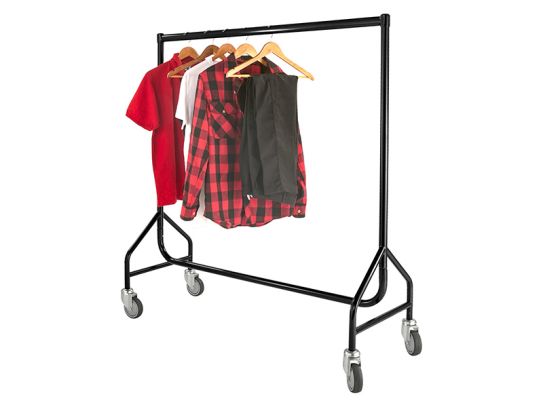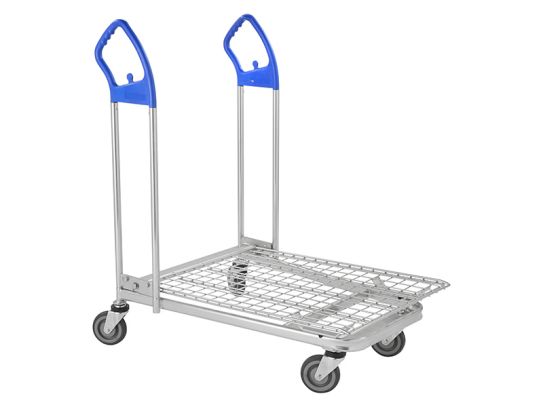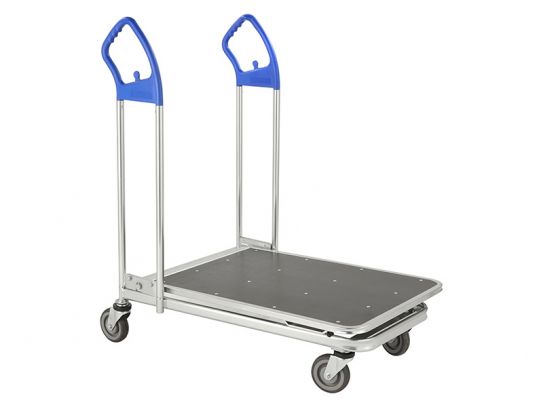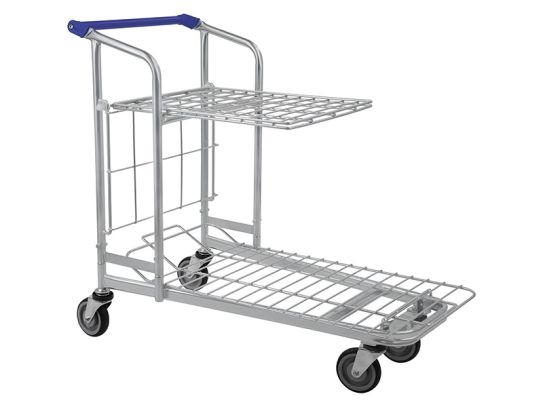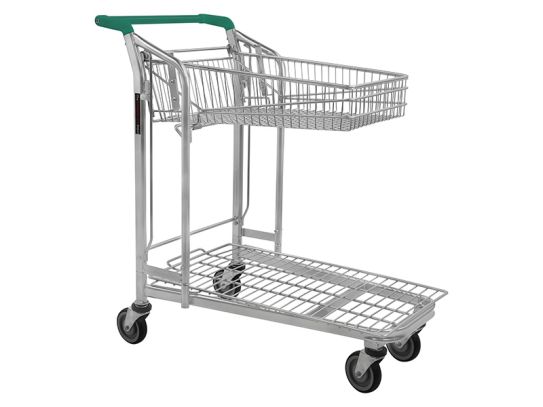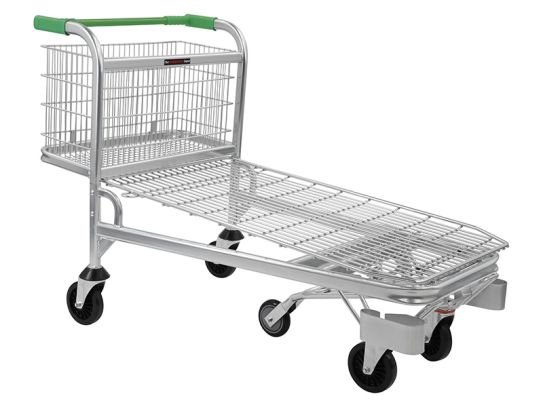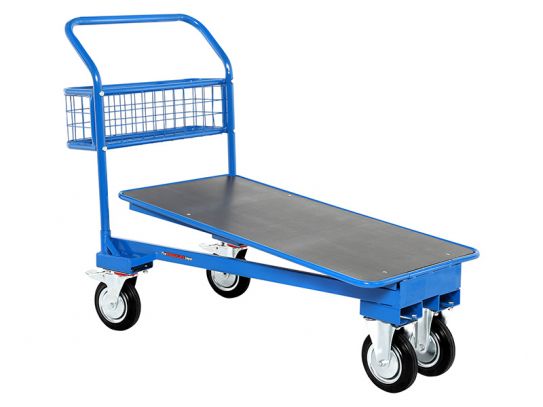Shopping & Retail Trolleys
Looking for the perfect trolley for your store? Look no further! Our shopping and retail trolleys are durable, convenient, and easy to use. Whether you need to transport groceries, stock shelves, or help customers with their purchases, our trolleys are up to the task. With a variety of sizes and styles to choose from, you can find the perfect trolley for your needs.
Efficiency Starts With the Right Trolley
Introducing our range of shopping and retail trolleys! These heavy duty trolleys are designed to handle all of your store's needs, from transporting bulk items in the Cash & Carry Trolleys to carrying boards in an upright position with the Sheet Material Trolleys.
Our Board Trolleys are perfect for those difficult to carry boards, such as wallboards and MDF sheets, while our Panel Trolleys make it easy to transport glass and other sheet materials safely and efficiently.
Whether you run a DIY store or a wholesale outlet, these trolleys are essential for keeping your store organised and efficient. So don't wait, upgrade your shopping and retail experience today with our top-quality trolleys!
What Are Shopping & Retail Trolleys?
Shopping and retail trolleys are carts that are used in stores for customers to carry their items as they shop. These trolleys can be found in a variety of stores, including supermarkets, department stores, and big box stores. They are designed to hold a large amount of items and make it easier for customers to move their purchases around the store and out to their vehicles. Shopping and retail trolleys come in a range of sizes and styles, depending on the needs of the store and its customers. Some trolleys are designed for use in self-service wholesale outlets, while others are specialised for carrying certain types of products, such as boards or sheet materials.
What Are Some Common Uses for Shopping & Retail Trolleys?
Shopping and retail trolleys are commonly used in stores as a convenient way for customers to carry their items as they shop. They are also used by store employees to transport items within the store, such as stocking shelves or moving products to and from storage areas. Some common uses for shopping and retail trolleys include:
- Carrying groceries and other items as customers shop in supermarkets and other stores
- Transporting products within a store, such as when stocking shelves or moving items to and from storage
- Helping customers move large or heavy items to their vehicles
- Organising and displaying products in a store
- Providing a convenient way for customers to carry their purchases out of the store and to their vehicles.
What Are the Different Types of Shopping & Retail Trolleys?
There are several different types of shopping and retail trolleys that are designed for specific purposes or to meet the needs of different types of stores and customers. Some common types of shopping and retail trolleys include:
- Standard trolleys: These are the most common type of shopping trolleys, and are typically found in supermarkets and other retailers. They have a large basket for holding items, and are usually made of metal with four wheels.
- Specialised trolleys: These trolleys are designed for specific types of products or stores, such as DIY stores or wholesale outlets. Examples include trolleys for carrying sheet materials or large boards, or trolleys for transporting glass or other fragile items.
- Folding trolleys: These trolleys are designed to be collapsible, making them easy to store and transport. They are often used by customers who need a trolley for a short period of time, such as when shopping at a farmers market or outdoor event.
What Are the Key Features to Consider When Choosing Shopping & Retail Trolleys?
There are several key features to consider when choosing shopping and retail trolleys. Some of the most important include:
- Size and capacity: Consider the size and capacity of the trolley based on the needs of your store and its customers. If you have a small store, you may want smaller trolleys that are easy to manoeuvre. If you have a large store with a lot of heavy items, you may want larger trolleys with a higher capacity.
- Material and durability: Choose trolleys that are made of sturdy, durable materials, such as metal, so that they can withstand heavy use and abuse.
- Wheel type: Consider the type of wheels on the trolley. For example, some trolleys have large, heavy-duty wheels that are suitable for rough or uneven surfaces, while others have smaller, smooth-rolling wheels that are better suited to smooth, flat surfaces.
- Ease of use: Look for trolleys that are easy to push and manoeuvre, with comfortable handles and a smooth ride.
- Price: Consider the price of the trolleys and whether they fit within your budget. Remember that it may be worth investing in higher-quality trolleys that will last longer and require less maintenance.
How Do I Care for and Maintain My Trolleys?
To keep your shopping and retail trolleys in good condition, you should follow a regular maintenance routine. Here are some tips for caring for and maintaining your trolleys:
- Clean the trolleys regularly: Dirt and debris can build up on the wheels and handles of trolleys, making them harder to push and potentially damaging them over time. Use a soft cloth or brush to sweep away dirt and debris, and wipe down the trolley with a mild cleaner if necessary.
- Check for wear and tear: Inspect your trolleys regularly for any damage or wear and tear, such as bent wheels or broken handles. If you notice any issues, take steps to repair or replace the trolley to prevent further damage.
- Lubricate moving parts: If your trolleys have moving parts, such as wheels or swivelling handles, make sure to lubricate them regularly to keep them moving smoothly.
- Store trolleys properly: When not in use, store your trolleys in a dry, sheltered area to protect them from the elements. This will help to prevent rust and other damage.
- Follow the manufacturer's instructions: If you have specific instructions from the manufacturer on how to care for and maintain your trolleys, make sure to follow them to ensure optimal performance and longevity.
What Safety Measures Should I Take When Using Trolleys?
Shopping and retail trolleys can be heavy and cumbersome, so it's important to take safety precautions when using them. Here are a few tips for maintaining safety when using trolleys:
- Make sure trolleys are in good working order: Before using a trolley, check that it is in good working order and free of any damage or defects that could cause accidents or injuries.
- Use trolleys as intended: Follow the manufacturer's instructions for using the trolley, and make sure to use it only for its intended purpose.
- Be mindful of other people: When pushing a trolley, be mindful of other people around you and give them plenty of room to move. Avoid sudden movements or sharp turns that could cause accidents.
- Use caution when loading items: Don't overload the trolley, and make sure to distribute the weight evenly. Avoid stacking items too high, as this can make the trolley unstable and harder to control.
- Keep children away from trolleys: Keep children away from trolleys, as they may not understand the risks and may try to climb on or play with them.
- Follow store policies: If you are using trolleys in a store, make sure to follow any policies or guidelines in place for their use. This may include rules about where to park the trolley or how to use it in the store.
Are There Any UK or European Industry Standards That Apply to Shopping & Retail Trolleys?
In the UK and Europe, shopping and retail trolleys are subject to a number of industry standards and regulations that aim to ensure their safety and functionality. Some of the key standards and regulations that may apply to shopping and retail trolleys include:
- EN 1570: This is a European standard that specifies the safety requirements for shopping trolleys. It covers trolleys used in supermarkets, department stores, and other retail outlets.
- BS EN 1757-1: This standard covers the safety requirements for powered trolleys, including electric and motorised trolleys. It applies to trolleys used in warehouses, factories, and other industrial settings.
- BS EN 1757-3: This standard covers the safety requirements for trolley conveyor systems, which are used to transport items within a warehouse or other industrial setting.
- The Health and Safety at Work Act 1974: This UK law sets out general duties for employers to ensure the health and safety of their employees and others who may be affected by their work. This includes taking appropriate measures to prevent accidents and injuries involving trolleys.
It's important to note that these standards and regulations are subject to change, and you should check with the relevant authorities to ensure that you are complying with the latest requirements.
